I didn’t have far left to go to exit Nigeria, but it would turn out to be a challenging enough day, that left me and the bike soaked and covered in mud!
It was raining in the morning, so I left a little late – about 7 o clock, by which point the rain was not so heavy. I passed a huge concrete plant. Hundreds upon hundreds of trucks were parked on the road nearby which was, unusually but appropriately, concrete.

I rode through the town of Ilaro, whereupon the roads deteriorated massively. There was lots of flooding, up to knee deep in places.

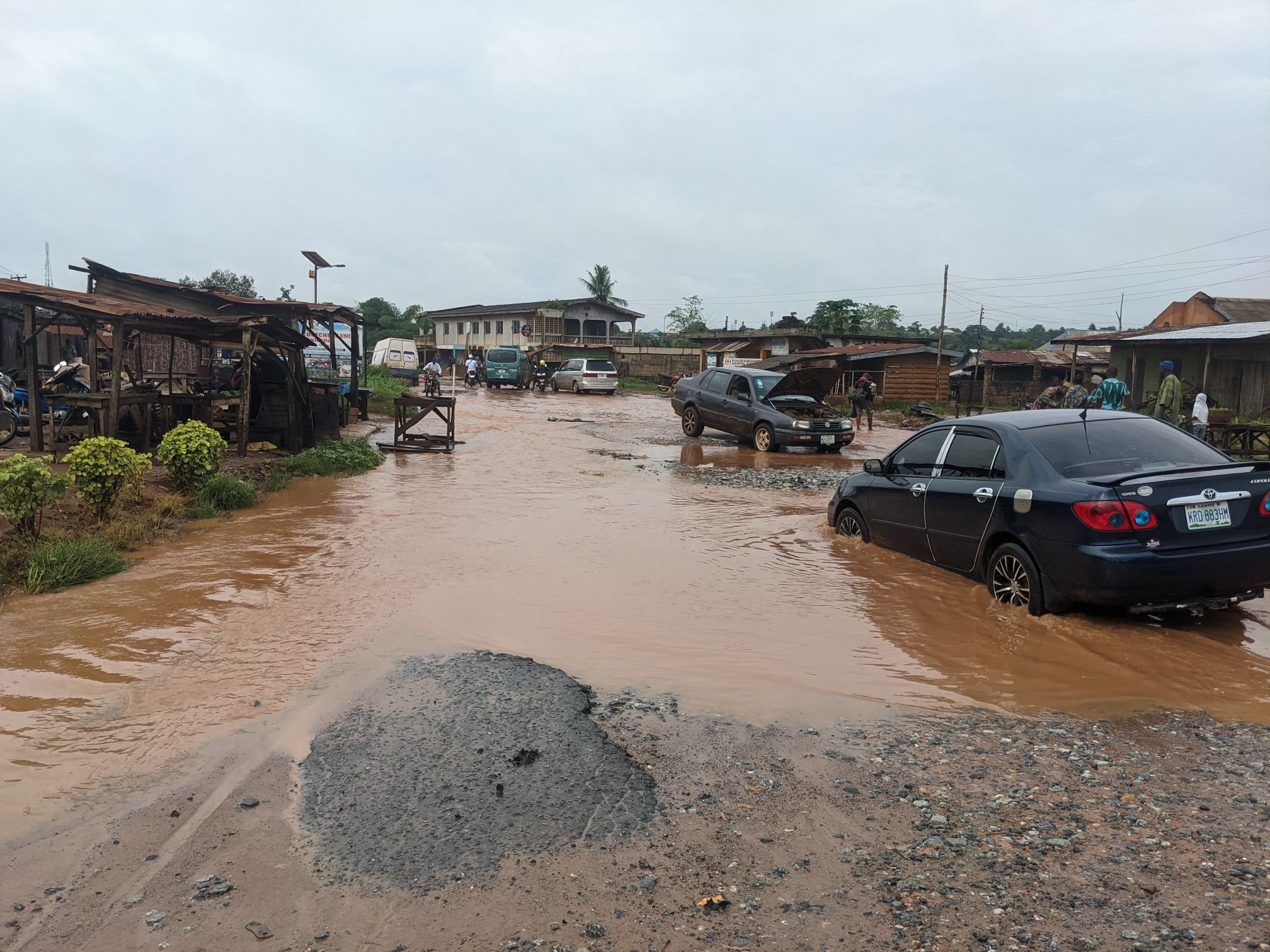
I’d not yet decided between a shorter minor road and a slightly longer major road which I expected to be better surfaced. Since the main road looked like the picture above while the smaller road was smooth tarmac, the decision was easy.
The road was very quiet and had significantly fewer potholes than was normal in Nigeria. Unfortunately, after reaching a large village, the tarmac came to an end. For about 15 kilometres I rode (and, at times, pushed) along a very muddy track.

The last few hundred metres of mud were particularly bad. Even some motorcyclists were pushing. It was very slippery, and the mud stuck to my tyres. It came to an end when I reached another large village and was back to cycling on tarmac.
A little while late I reached the main road which brought me the last ten kilometres to the border. I made my way to Nigerian immigration. First up my vaccinations were checked and my details entered into a logbook. Then I went inside and got my exit stamp fairly easily. After that someone entered my details into yet another book. She worked extremely slowly, presumably in an effort to get me to pay a bribe to speed things up. Locals typically just hand cash to the officials and go through. Once this woman had finally finished, another woman called me over, seemingly for the same thing. I already had my exit stamp so I just pretended I couldn’t hear her, and made my way over to the Benin side.
The Beninese immigration office was a smaller, friendlier affair. I’d applied for my Benin e-visa with my British passport, as my Irish one was running out of space. The immigration officer thought he should stamp the Irish one, as that’s where the Nigerian exit stamp was. Once I explained, he was happy to stamp the (correct) British one.
I tried to get a sim card near the border but after multiple attempts they weren’t able to register one with my passport so I gave up and rode on. I exchanged my remaining Naira into West African Francs (CFA). I’ll be using these on-and-off over the next ten countries or so.
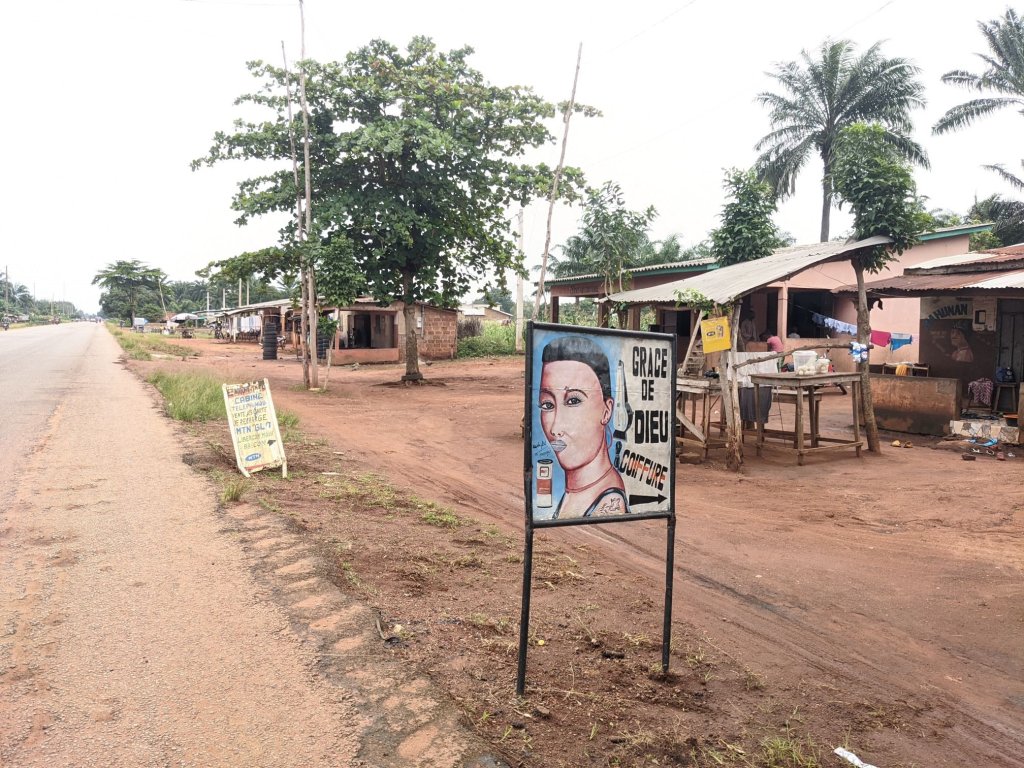
Not long past the border I rode through Porto Novo, a city that is officially (but not really) Benin’s capital.
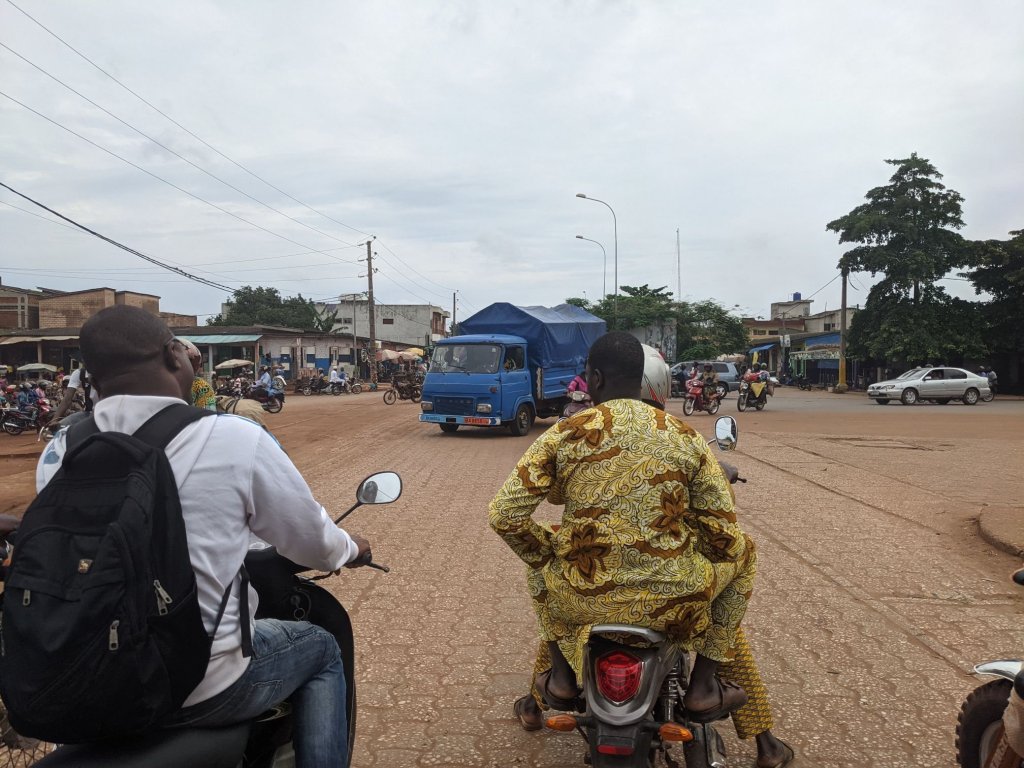
I cycled south out of the city on the highway that links Porto Novo to Cotonou, the de facto capital. Initially, the right hand side of the road was effectively a motorbike lane.
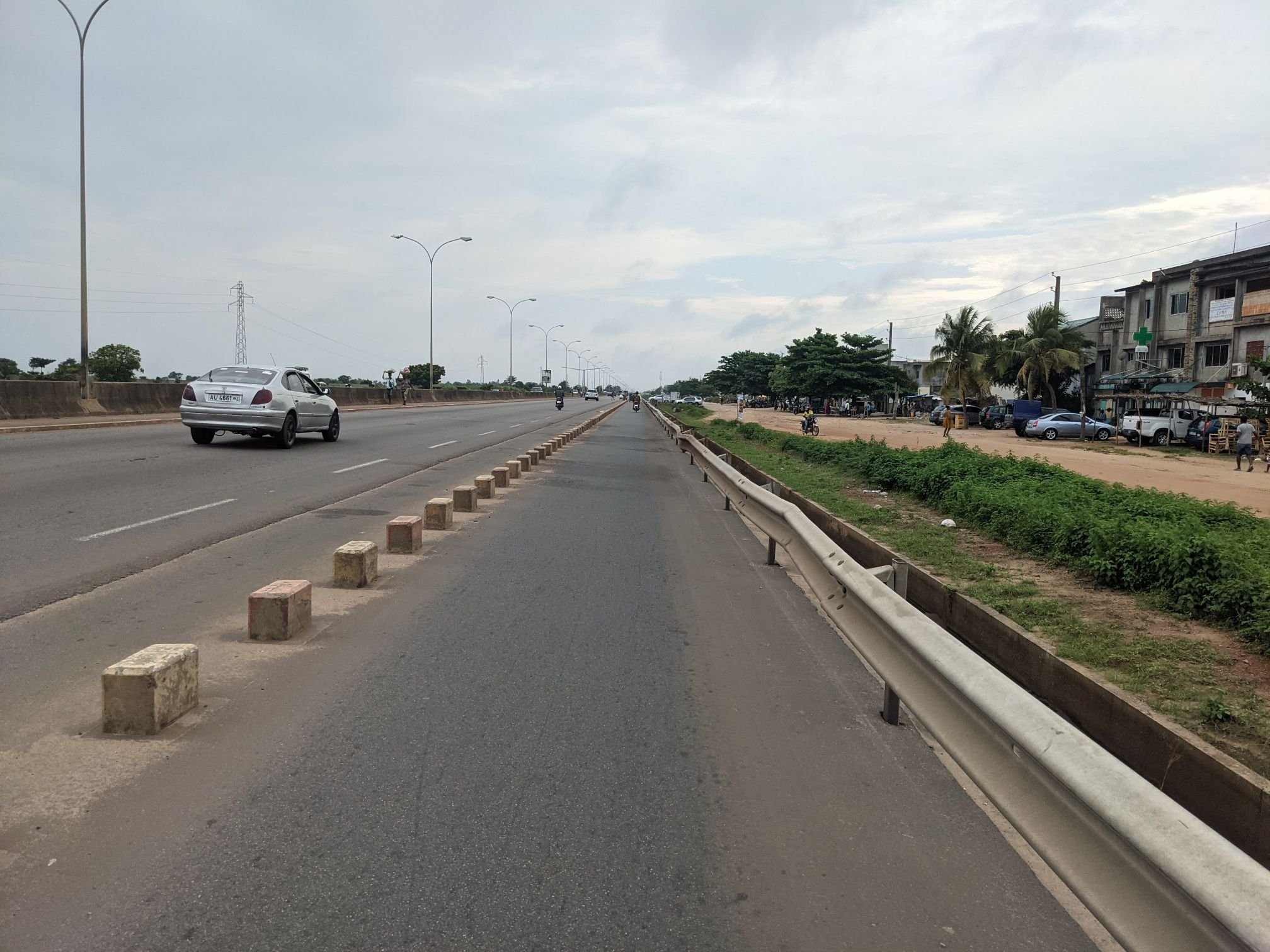
After a while the motorbike lane was separated from the main road. It was very busy and this meant I was constantly being passed quite closely by motorbikes. Worse, though, were the larger vehicles like tuktuks and motorized cargo tricycles. There was only just enough room for them to pass me, and they always started to move back over as soon as the driver was past – meaning the back of the vehicles nearly crushed me against the rail. After this happened a few times, I went over to the main road, which had a basically unused shoulder that was much more pleasant.
I reached a suburb which had, according to my map, lots of hotels. The first one I went to was more expensive than I’d like but they recommended another hotel, the 15th of January. I made my way over to where my map said that was located. However, the hotel there only charged by the hour – which would be even more expensive if I stayed the night. As it turned out, the actual 15th of January hotel was just round the corner and they had rooms for 7000 CFA (£10 or so) a night, so I took one. It was nice being back in a country where the electricity (and thus the fan) works the whole time!
I spent the morning cleaning my bike, which had become completely covered in mud during my last day in Nigeria. Once I was satisfied it was clean enough that embassy security would at least let me in to the car park, I set off. My first stop was the embassy for Ivory Coast.
They were happy to issue visas but that was not my main concern. Ivory Coast’s land borders remain closed due to Covid. Since I successfully got my Nigerian visa in Luanda, getting into Ivory Coast was the only major bureaucratic issue I anticipated.
Crossing the land border requires a Laissez Passer document. These seem to be quite easy to get for those heading southbound (the embassy in Liberia provides them). Northbound is a less popular direction. I know of two motorcyclists who managed to cross. One showed up at the border(with a visa) and eventually managed to get in. Another went via Burkina Faso and got the Laissez Passer there. It’s quite an unstable country so that’s an option I probably won’t take.
Since the embassy in Benin wouldn’t provide a Laissez Passer I figured there was no point getting a visa here; I might as well try and get both in Ghana. So I set off to the Ghanaian embassy.
I knew from iOverlander that this application would need 4 passport photos, so I stopped at a photo studio on the way in. I chatted to them a bit about my travels; they seemed impressed. While they were printing the photos I went next door to have some photocopies done. I came back to collect the photos and was told they were free!
On the way to the embassy I stopped and checked into a hotel. At 10,000 CFA (£13) it was a bit expensive but it was in a nice area and I wanted somewhere nice to stay since I anticipated waiting a while for the visa.
Finally I made it to the embassy. The woman working there asked if I was resident in Benin. When I said no, she said I therefore couldn’t apply for a visa. This is a longstanding rule for Ghana – like Nigeria, one can (officially) only apply for the visa in one’s home country. However, like others have done at this embassy, I told her I was travelling overland and hasn’t been in my country for about a year. She asked that I write up a letter describing my travels, and bring some photocopies of other visas as proof.
There wasn’t long left before they stopped accepting applications so rather than rush around I decided to leave that for the next day. In the meantime, I went to the supermarket. Benin has a Super-U supermarket, a French chain. It really was just like being in a French supermarket, though the prices were higher (Roquefort was £50 a kilo). I bought myself some overpriced junk food (but no Roquefort) and headed back to the hotel.
The next morning (Thursday) I returned to the embassy with all the relevant documents and submitted my application. She wasn’t sure how long it would take but said she’d give me a call. Monday was a Ghanian public holiday so we agreed I’d come back on Tuesday if I didn’t hear anything.
I enjoyed my time off the bike. I had a big room at the hotel, with a good fan and a mosquito net – the first mosquito net I’ve used since Zambia. There were three supermarkets near the hotel and I soon learned what to buy where. One shop had cheese and some western luxuries, another had fresh bread and the third had cheaper staples.
I returned to the embassy on Tuesday afternoon. I’d not heard anything, but figured it was worth a try. The secretary had a look in a drawer and there was my passport, visa included.
After 5 days of rest, I set off early the next morning. It was raining and continued to do so for much of the morning. There was a lot of traffic coming into the city, but not much on the way out. I took a photo, but the rain had got on the lens…

Signposts gave directions to unusually distant places: Lome, Accra and Abidjan. These are the capitals of the next three countries.

The cycling was a lot more pleasant than in Nigeria. Almost no one was shouting at me. The road wasn’t potholed so drivers weren’t swerving all over the place.
The day was pretty flat. There was one “climb” up to the dizzying heights of 30 masl. It soon dropped back to sea level before altitude sickness had a chance to really set in.

The border between Benin and Togo is a bit strange. Just before the border reaches the sea, it curves to the side. Benin has a stretch of land that’s about 20km long and 1km wide.
This narrow stretch was densely farmed. It looked unusually neat, with perfectly straight lines separating the different crops. On my left, I could see the beach.

I reached the border and had the simplest crossing in ages. I got my exit stamp from Benin then went into the next room to buy my Togo visa. As I cycled away, there was a policeman checking stamps. He asked for money, showing the cash the people before me had given as demonstration. I refused and rode off.
I continued riding along the Togolese coast. Togo is a very narrow country and after about 50km I reached the capital, Lome. I went and checked in to a hotel, then went for a walk. There was a woman selling falafel sandwiches and, as I was buying one, she chanted “Baturei, Baturei.” I asked if she was Nigerian; she was. Baturei is the Hausa word for white person, used in the northern parts of Nigeria. I can now tell what country someone is from by what word they use for white people!
The main thing I wanted to see here was the voodoo market. Unfortunately it’s very much a tourist site and I had to pay 5000 CFA (£7) to enter and take photos. This did include a guide though and it meant I didn’t feel bad about photographing without buying anything.
Most of the stalls there had various body parts – mostly skulls and heads. There were also quite a few snake spines which were quite interesting. A voodoo priest considers someone’s ailment and then selects the appropriate body part which is typically ground into a powder to be rubbed on the body. Interestingly, my guide was at pains to explain that they now recommend people go to a hospital first and only come here if that doesn’t work.



There were also lots of ornamental pieces, dolls and masks. There were a few statues of voodoo gods as well.
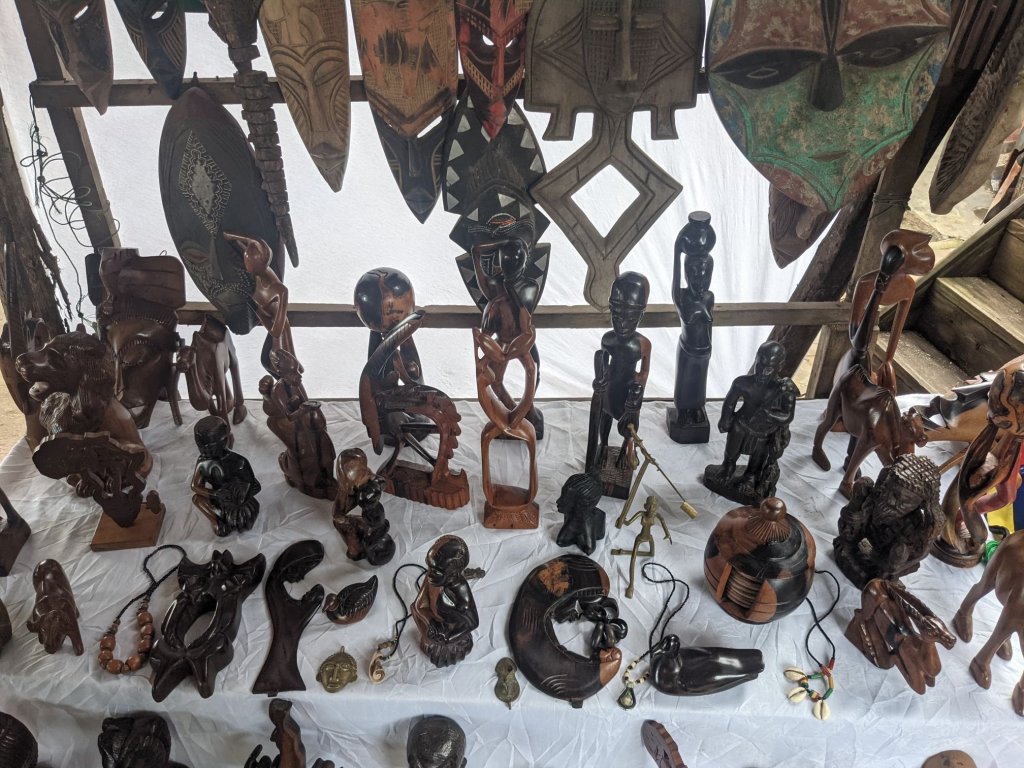



My guide took me to the house of one of the voodoo priests, inside the market. He showed us various charms he would sell people for different functions.
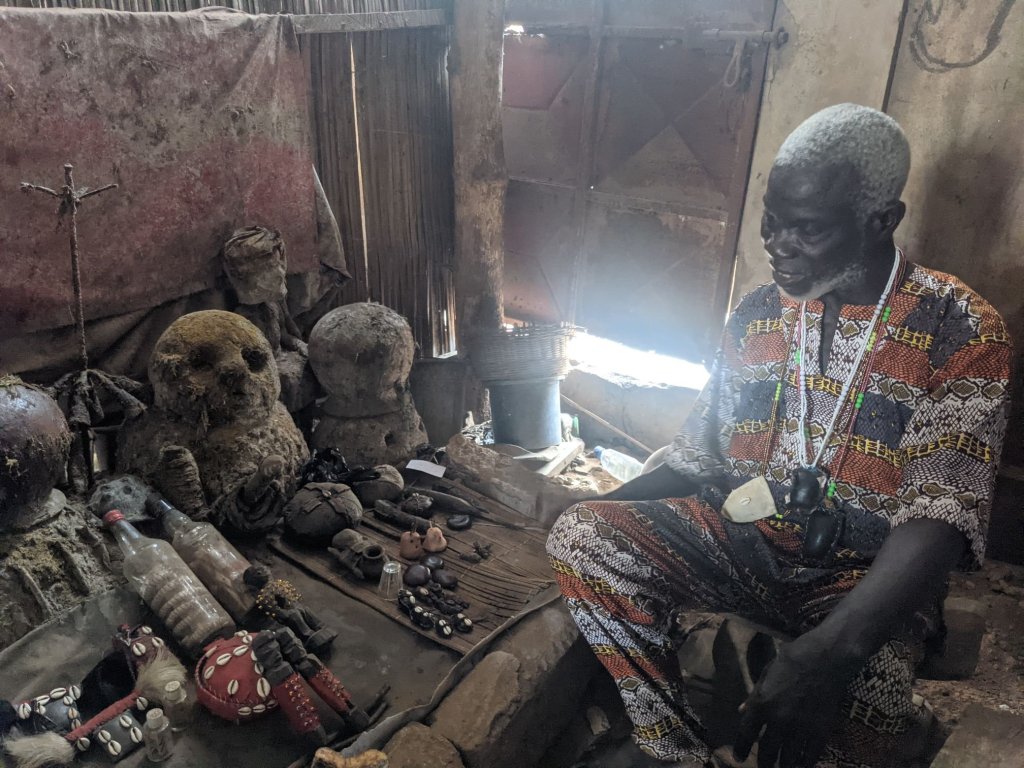
After that I returned to my hotel. My stay in Togo is very brief, as it’s only 10km from here to Ghana, which I planned to enter the next day.
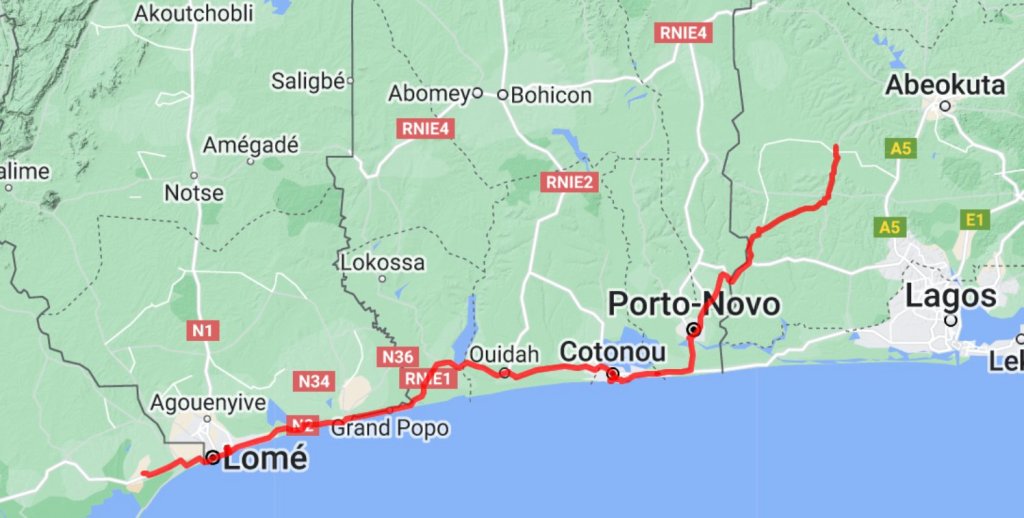
July 5: 119 km
July 6: 20 km
July 13: 146 km
Hi Sam, did you stop blogging? Did you make it to Northern Africa?
LikeLike